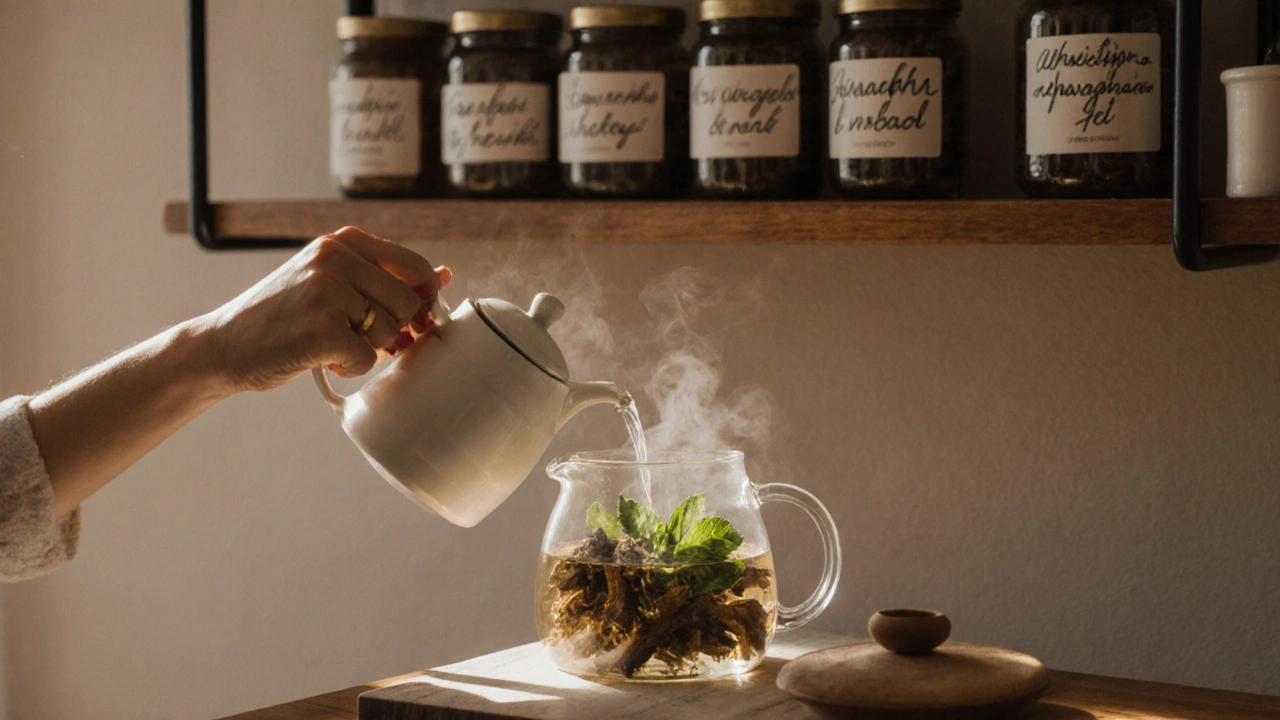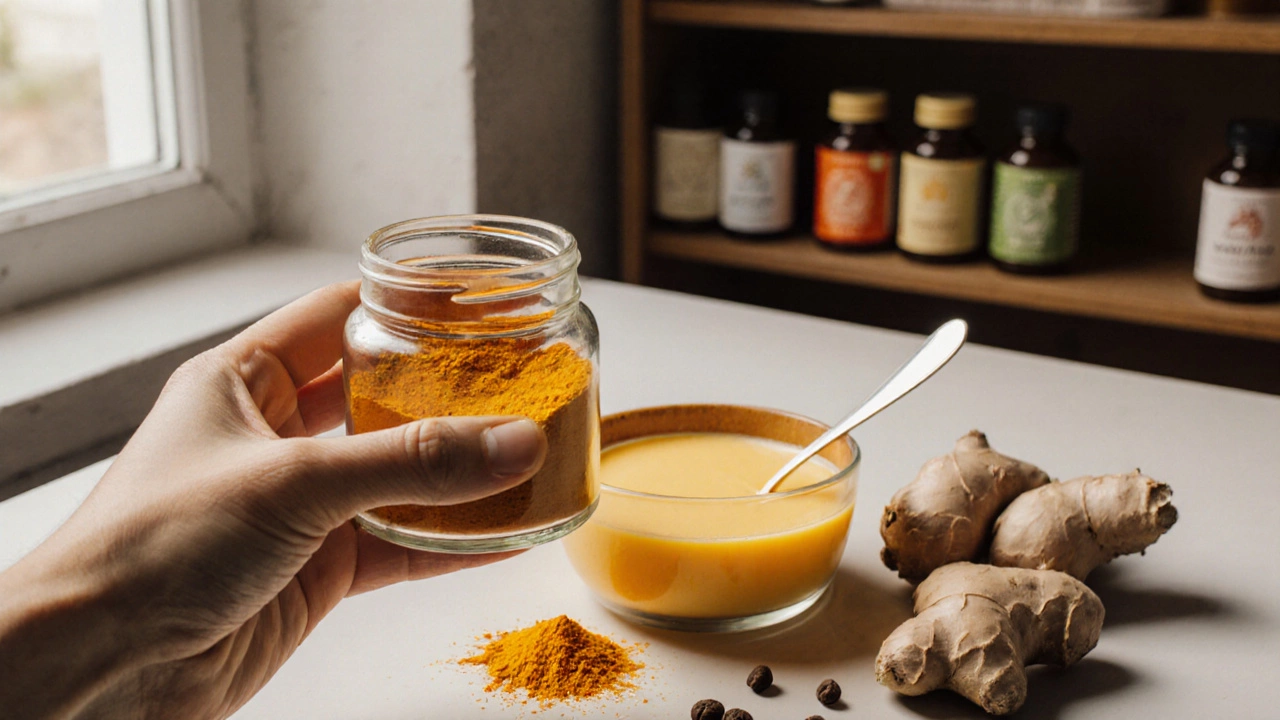What Are the 5 Types of Herbal Supplements and How They Actually Work?
 Nov, 9 2025
Nov, 9 2025
People reach for herbal supplements for all kinds of reasons-sleep troubles, low energy, joint pain, or just to feel more balanced. But not all supplements are the same. There are five main types, each with a different purpose, active ingredients, and real-world effects. Knowing the difference helps you pick what actually works for you, not just what’s flashy on the shelf.
Adaptogens
Adaptogens are herbs your body uses to handle stress. They don’t boost energy like caffeine. Instead, they help your nervous system stay steady when life gets chaotic. Think of them as your body’s internal thermostat for stress.
Popular ones include ashwagandha, rhodiola, and holy basil. Ashwagandha, for example, has been shown in multiple clinical trials to lower cortisol levels by up to 30% in people with chronic stress. It’s not a quick fix-it takes 4 to 6 weeks of daily use to notice changes. People in the UK who work long hours or juggle family and jobs often report better sleep and fewer afternoon crashes after using it consistently.
What makes adaptogens unique is they work differently depending on what your body needs. If you’re burned out, they help you relax. If you’re sluggish, they gently lift your energy. That’s why they’re called adaptogens-they adapt to you.
Herbal Tonics
Herbal tonics are about long-term support, not instant results. These are the herbs your grandparents might have brewed into teas for winter colds or spring cleanses. They’re gentle, safe for daily use, and build resilience over months or even years.
Examples include astragalus, reishi mushroom, and nettle leaf. Astragalus is widely used in Traditional Chinese Medicine to strengthen the immune system. A 2023 study in the Journal of Herbal Medicine found that people taking astragalus extract had fewer colds over a 12-week period compared to those taking a placebo. Nettle leaf, common in British herbalism, supports kidney function and helps with seasonal allergies-many people in Birmingham use it in spring to reduce sneezing and itchy eyes.
Unlike pills you take for a week, tonics are meant to be part of your routine. You might drink nettle tea every morning or take astragalus capsules during flu season. They’re not magic, but they’re reliable when used over time.
Herbal Stimulants
These are the quick-pick-me-ups. They give you a boost, but they come with trade-offs. If you’ve ever felt jittery after green tea or had trouble sleeping after yerba mate, you’ve felt herbal stimulants at work.
Caffeine-containing herbs like guarana, green tea, and yerba mate are the most common. But there are also non-caffeine stimulants like ginseng and yohimbe. Ginseng can improve mental focus and physical endurance, which is why athletes and shift workers use it. But it can also raise blood pressure in sensitive people.
Yohimbe, derived from an African tree bark, is sometimes sold as a weight-loss aid or libido booster. But it’s risky. The UK’s Medicines and Healthcare products Regulatory Agency (MHRA) has warned against unregulated yohimbe products due to links to heart palpitations and anxiety. Stick to standardized doses from trusted brands, and never mix them with prescription meds.
Herbal stimulants are fine in moderation-but if you’re relying on them daily, it’s a sign you need to look at sleep, diet, or stress instead.

Herbal Anti-Inflammatories
Chronic inflammation is behind most long-term health issues-joint pain, digestive problems, even brain fog. Herbal anti-inflammatories target that root cause without the side effects of NSAIDs like ibuprofen.
Turmeric (curcumin) is the most studied. One gram of curcumin daily has been shown in trials to reduce knee pain in osteoarthritis patients as effectively as ibuprofen, but without stomach irritation. Ginger is another powerhouse-studies show it reduces muscle soreness after exercise by up to 25%. Boswellia, also called frankincense, helps with arthritis and even inflammatory bowel conditions.
These herbs work best when taken consistently. Turmeric needs piperine (from black pepper) to be absorbed properly. That’s why many supplements combine them. If you’re using them for joint pain, give it 6 to 8 weeks. Don’t expect overnight relief, but if you stick with it, many people report being able to walk farther, climb stairs easier, or play with their kids without pain.
Herbal Digestives
Your gut affects everything-from mood to immunity to skin health. Herbal digestives help your body break down food, reduce bloating, and restore healthy gut bacteria.
Peppermint oil is the most effective for IBS. Clinical guidelines in the UK and Europe recommend enteric-coated peppermint oil capsules for people with bloating, cramps, and irregular bowel movements. In one trial, 75% of users saw significant improvement after 4 weeks. Fennel seed and chamomile are gentle enough for kids and pregnant women to help with gas and upset stomachs.
Bitters like dandelion root and gentian are older remedies that stimulate bile flow and digestive enzymes. They’re not sweet, but they work. Many people in the UK take a teaspoon of dandelion root tincture before meals to improve appetite and reduce post-meal heaviness.
Unlike laxatives or antacids, herbal digestives don’t mask symptoms-they help your body do its job better. If you’re constantly bloated or feel full after eating a small meal, this category might be your missing piece.

How to Choose the Right One
Don’t just grab whatever’s on sale. Ask yourself: What’s the real issue?
- Feeling drained all the time? Try an adaptogen like ashwagandha.
- Always catching colds? Look at astragalus or reishi.
- Joint pain or stiffness? Turmeric and ginger are your best bet.
- Bloating after meals? Peppermint oil or fennel.
- Need a morning boost without coffee? Try green tea extract or ginseng-but don’t overdo it.
Also, check the label. Look for standardized extracts (e.g., “5% curcuminoids” or “10:1 concentrated ashwagandha”). Avoid products with fillers like magnesium stearate or artificial colors. And always buy from UK-based suppliers that follow Good Manufacturing Practices (GMP).
What to Avoid
Not all herbal supplements are safe. Some interact with medications. St. John’s Wort can reduce the effectiveness of birth control and antidepressants. Kava has been linked to liver damage and is banned in several EU countries. Comfrey and ephedra are outright dangerous and should never be used.
If you’re on blood thinners, thyroid meds, or have liver or kidney issues, talk to a pharmacist before starting anything. Herbal doesn’t mean harmless.
Real Results Take Time
Herbal supplements aren’t pills you pop for instant results. They’re tools that work with your body’s natural systems. That means patience. Most people see changes after 3 to 6 weeks of daily use. Some, like immune tonics, take months.
Keep a simple journal: note how you feel each morning-energy, sleep, digestion, pain. After a month, you’ll start to see patterns. That’s how you know what’s working.
And remember: supplements don’t replace good food, sleep, or movement. They support them. The best herbal supplement in the world won’t fix a diet full of processed sugar or 4 hours of sleep a night.
Are herbal supplements regulated in the UK?
Yes, but differently than prescription drugs. The MHRA classifies herbal supplements as traditional herbal remedies (THR). To be legally sold, they must be registered and meet safety and quality standards. Look for the THR logo on the packaging. Unregistered products may not be safe or contain what they claim.
Can I take herbal supplements with my prescription meds?
Some can, but many can’t. St. John’s Wort, garlic, ginkgo, and ginger can interfere with blood thinners, antidepressants, and blood pressure meds. Always check with your pharmacist before combining herbal supplements with prescription drugs. They can spot dangerous interactions you might miss.
Which herbal supplement is best for sleep?
Valerian root and passionflower are the most studied for sleep. Valerian helps you fall asleep faster and improves sleep quality without the grogginess of sleeping pills. A 2021 review in Complementary Therapies in Medicine found it worked better than placebo in 60% of users. Take it 30 to 60 minutes before bed. Avoid mixing with alcohol or sedatives.
Do herbal supplements have side effects?
Yes. Even natural herbs can cause nausea, headaches, allergic reactions, or interact with other substances. Turmeric can cause stomach upset in high doses. Ginseng may raise blood pressure. Always start with a low dose and watch how your body reacts. If you feel worse, stop and consult a professional.
How long should I take herbal supplements?
It depends. Adaptogens and tonics are often taken for 3 to 6 months, then paused for a few weeks. Stimulants should be cycled-take them for 4 to 6 weeks, then stop for 2 weeks. Anti-inflammatories like turmeric can be taken long-term if you’re managing chronic pain. Digestives like peppermint oil are usually taken short-term during flare-ups. Listen to your body and adjust.
If you’re unsure where to start, talk to a registered medical herbalist. They’re trained in the UK to assess your health, medications, and goals before recommending specific herbs. They’re not the same as a shop clerk pushing the latest trending supplement.
The right herbal supplement, used correctly, can make a real difference. But only if you know which type you need-and why.